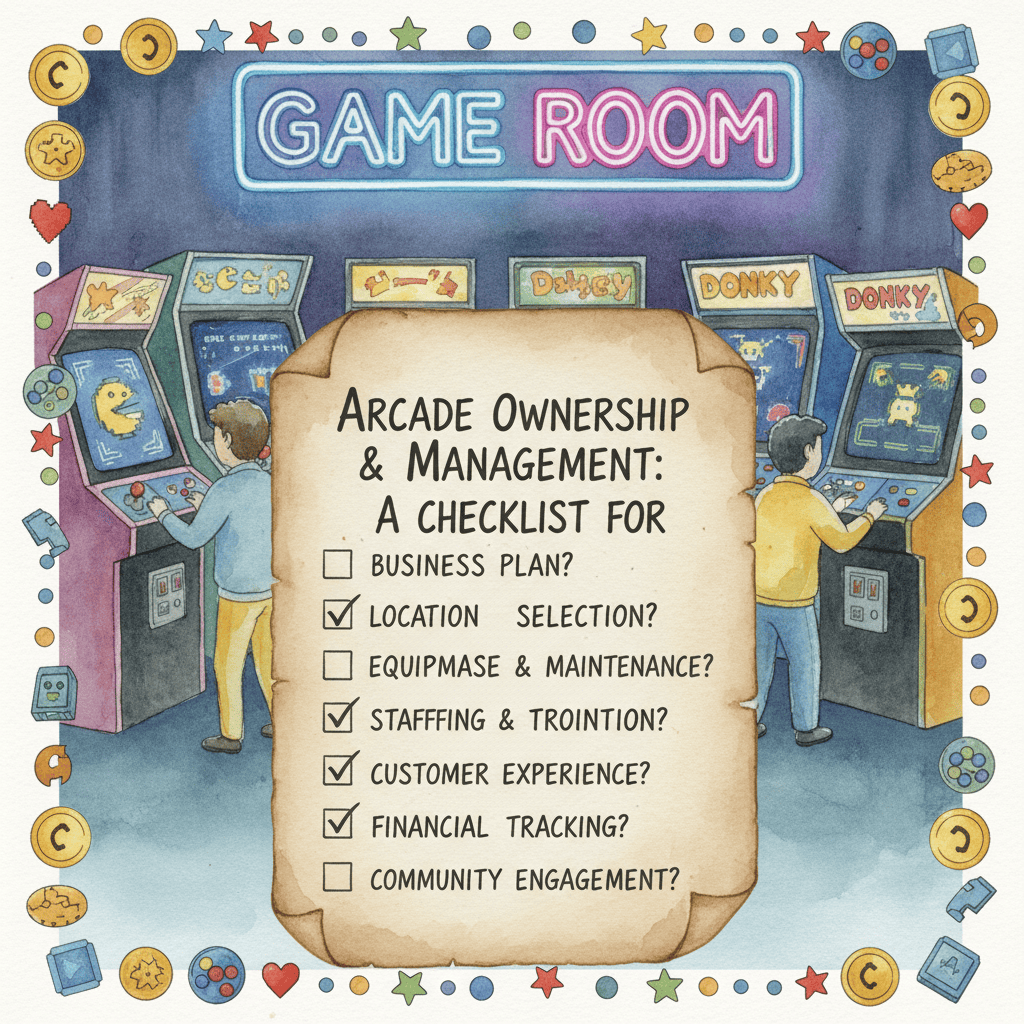Launching or maintaining a successful arcade business requires a keen understanding of the market, meticulous planning, and a passion for the games themselves. This guide serves as a roadmap for navigating the intricacies of arcade ownership and management, from initial setup to ongoing operations. This deep dive into the arcade business covers everything from initial investment to long-term profitability.
Securing the Foundation: Planning Your Arcade Venture
Before the first joystick is plugged in, a robust business plan is essential. This is not merely a formality; it’s the bedrock of your arcade’s success. A comprehensive arcade business plan should include:
- Market Research: Identifying your target audience (families, hardcore gamers, etc.) and analyzing competitor arcades in your area. Consider factors like demographics and local demand for specific game genres. What are the local trends? Are there any underserved niches you can exploit?
- Location Selection: Choosing a site with high foot traffic, sufficient space for your planned game selection, and accessible parking. Lease negotiations and local zoning laws are crucial factors here. Consider the visibility of your location; a busy shopping mall versus a hidden side street will yield drastically different results.
- Financial Projections: Determining startup costs, including arcade equipment, leasehold improvements (such as flooring and lighting), permits, and initial marketing efforts. Thorough
arcade startup costsanalysis is crucial for securing funding and ensuring long-term financial stability. Also, include a detailed plan for ongoing expenses, such as rent, utilities, game maintenance, and staff salaries. Predictingarcade profitabilityrequires careful attention to this detail. - Legal and Regulatory Compliance: Understanding and adhering to all local, state, and federal regulations concerning business licenses, health and safety codes, and game licensing. This includes the necessary insurance policies for your equipment and potential liability issues. Ignoring this could lead to significant legal issues and fines.
Game On: Selecting and Maintaining Your Arcade’s Games
The heart of any successful arcade is its game selection. A balanced mix of classic titles and modern hits can draw a broad clientele. This includes considerations of:
- Genre Diversity: Offering a variety of genres – fighting, racing, rhythm, puzzle, and shooting games – caters to diverse tastes and maximizes your appeal to a broader audience.
- Game Condition: Maintaining your arcade games in top condition is crucial. Regular cleaning, maintenance, and prompt repair of malfunctioning machines is essential for a positive player experience. Consider budgeting for specialized
arcade maintenance and repairservices. - Game Rotation: Periodically updating your game lineup with new releases or popular titles keeps things fresh and prevents your arcade from becoming stagnant. This will help to attract returning customers and encourage word-of-mouth marketing.
- Emulation vs. Original Hardware: Carefully weigh the pros and cons of using emulation versus original arcade cabinets. Emulation may offer more variety at a lower initial cost, but original hardware may have a greater appeal to nostalgia-driven gamers.
Attract the Crowd: Marketing Your Arcade
Effective marketing is vital for attracting and retaining customers. A multi-pronged approach can significantly impact your success:
- Online Presence: A user-friendly website and active social media presence are crucial for spreading the word about your arcade, sharing promotions, and engaging with potential customers.
- Local Partnerships: Collaborating with local businesses, schools, or community groups to promote your arcade can increase your reach and brand visibility. Consider discounted rates for group bookings or student specials.
- Promotional Events: Organizing themed events, tournaments, or special offers – like family game nights or “high score” challenges – can generate excitement and attract new customers.
- Loyalty Programs: Implementing a loyalty program to reward repeat customers can significantly impact customer retention, fostering a strong and loyal gaming community around your
arcade management.
Managing the Business: Operations and Staff
Effective management is the key to a smoothly running arcade. This includes:
- Staff Training: Hiring friendly and knowledgeable staff who are passionate about arcade games and possess good customer service skills. Comprehensive training in game operation, troubleshooting, and customer interaction is essential.
- Inventory Management: Tracking game usage, parts inventory, and potential repair needs for proactive maintenance. Efficient inventory management will help reduce downtime and save money in the long run.
- Financial Management: Maintaining accurate financial records, tracking revenue and expenses, and regularly reviewing your financial performance to identify areas for improvement. This includes monitoring your
arcade business plan‘s projections versus actual results to make adjustments as needed. - Customer Service: Providing a welcoming and enjoyable atmosphere; responsive to customer feedback and addressing concerns promptly. Positive word-of-mouth is invaluable for any business.
People Also Ask
What are the legal requirements for opening an arcade?
The legal requirements vary by location, but generally include obtaining the necessary business licenses and permits, adhering to fire safety codes, and ensuring compliance with all relevant gaming regulations.
How much does it cost to open an arcade?
The cost varies significantly depending on location, size, the number of games, and the level of refurbishment needed for the space. Budget for at least $50,000 for a modest establishment, potentially much more for a larger and more advanced arcade.
How can I make my arcade profitable?
Profitability depends on a combination of factors including strategic location, a well-chosen game selection, effective marketing, efficient management, and a focus on providing excellent customer service.

What type of arcade games should I offer?
A diversified selection catering to various age groups and preferences is key. Consider including classic titles alongside modern hits, and incorporate different genres for broader appeal.
How do I attract customers to my arcade?
Utilize a combination of online marketing (website, social media), local partnerships, promotional events, and a strong focus on customer service.
What are the best marketing strategies for an arcade?
Effective strategies include targeted advertising (online and local), partnerships with local businesses, social media engagement, and creating exciting themed events.
How do I manage my arcade staff effectively?
Provide thorough training, clear communication, consistent scheduling, and create a positive work environment to encourage staff productivity and excellent customer service.
Is owning an arcade profitable?
The profitability of an arcade depends on various factors and careful management. A well-planned and executed business strategy with a focus on customer experience and efficient operations is essential for success.
Take Action: Launch Your Arcade Empire
The arcade industry has a rich history and shows promise for future growth. Whether your vision involves a nostalgic tribute to classic games or a cutting-edge gaming center, meticulous planning and execution are crucial. Remember, the key to success is a well-defined arcade business plan, a diverse and well-maintained game selection, a vibrant marketing strategy, and an unwavering commitment to providing an exceptional player experience.
Key Takeaway: Owning and managing a successful arcade isn’t just about games; it’s about building a community and crafting an unforgettable experience for your players. A proactive and adaptable approach, combined with a deep understanding of the market, is the key to unlocking lasting success.
Charting a Course to Arcade Success: A Comprehensive Guide for Owners and Managers




